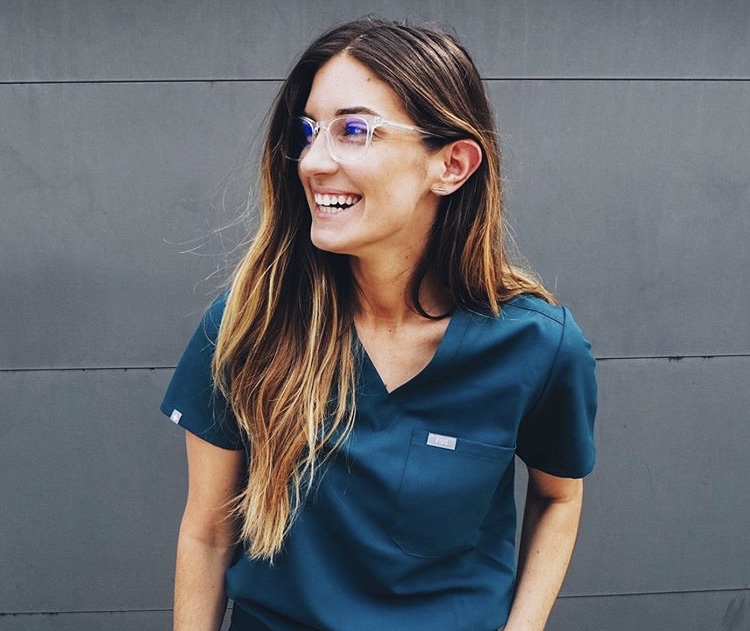Nursing Clinical During COVID: Tips for Staying Safe
/Tips for Managing Clinical During COVID
From juggling multiple courses, keeping grades up, learning complex skills, studying for boards and trying to curate a competitive resume, pursuing a nursing degree is beyond stressful. Amongst all of this, what do nursing students find the most stressful of all? Clinical (Dunh Dunh Dunhhhh!).
Like many students, this may be the first time you have been in a hospital or clinic setting working with real people, real patients. You are learning to take vitals, start IVs, chart, use complex thinking, respond to real emergencies. It’s normal to feel an immense weight of pressure, responsibility, and…fear.
It’s 2020, so let’s throw a pandemic on top of all of this. I would be worried if you as a student didn’t feel overwhelmed or uncertain right now. Learning to care for patients is hard enough, and the pandemic has brought additional challenges we could have never anticipated.
If you are a student going on-site to clinical, I’m here to tell you that you are not alone in your fears or stress. To make sure you feel as safe as possible heading into clinical, let’s get you up to speed with the tips & tricks healthcare workers have been utilizing for months throughout this pandemic to decrease their exposure to COVID-19.
After working in a clinic swabbing for COVID all summer, I have lots of insight!
BEFORE HEADING IN
Make sure you are up to date with your University’s and/or clinical site’s compliance. To ensure safety, most sites are requiring additional COVID screens and temperature logs. Put a reminder in your phone and keep your thermometer in a place you will see it. For my students, anything over 100.0F is now considered a troublesome temp.
Ask about your sites’ COVID protocols & precautions ahead of time, as well as the PPE available. Your clinical instructor should let you know what your institution is/is not providing. They should also reassure you that as a pre-licensure student, you will not be going anywhere near a COVID patient or COVID floor.
If you feel more comfortable bringing additional PPE from home (N95 mask, goggles, scrub cap, etc) ask your clinical instructor. This should be fine but some units are more strict than others when it comes to BYO PPE.
If you are considered high-risk, pregnant, have at-risk children at home, take care of at-risk family members, or have other specific COVID-safety concerns, take them to course instructors and up the administration ladder. Your safety is most important!
In pre-COVID days, menstrual cramps and a little headache were not excuses to miss clinical. That’s now thrown out the window. If you develop any COVID symptoms defined by the CDC, stay home and let your instructor know ASAP. Do not second guess your symptoms. Do not feel bad. Do not worry if your think your peers will judge you. Prioritize your health and the health of your fellow classmates and patients. Follow up with protocols on monitoring symptoms, self-quarantine and getting tested.
AT YOUR SITE
Even though you should not be working with COVID patients, you must be aware of potential exposure from other employees, students or patients that could be carriers or pre-symptomatic of COVID. Why not be as safe as possible!
General hand hygiene practices and knowing the correct sequence of putting PPE on/off matter now more than ever. If you haven’t already done so, become an expert at washing our hands and being mindful of not touching your face.
ALWAYS practice hand hygiene before removing your mask!
Remember soap and water should be used over hand sanitizer when hands are visibly soiled, after using the restroom and before eating.
Nursing students are usually required to keep hair tied back and nails short anyways, so don’t expect any exceptions to this now.
Social distancing with your patient obviously is not possible, however try to distance yourself from fellow students and staff members when you can and limit the amount of people/patients you are getting in close contact with.
Avoid crowded elevators and take the stairs instead if you can.
Eat alone, away from others.
Disinfect work stations and computer keyboards for charting often.
Leave all nonessentials at home and bring only what you need into clinical. Less stuff means less surfaces for contamination and less things to disinfect.
If using a personal stethoscope, disinfect before and after use with every patient.
Keep phones far, far away from patient care areas. If you need to hop on your phone, make sure you disinfect it. Get in the habit of doing this frequently, and definitely wipe it down if you are taking a break to eat. Consider storing it in a clear, sealable bag.
POST-SHIFT DECONTAMINATION ROUTINE
Although the research is not clear on COVID being transferred on your scrubs, healthcare professionals have been practicing religious post-shift decontamination routines to avoid bringing anything into their house or to their loved ones.
Bring a change of clothes (clean scrubs, sweats or a t-shirt, whatever is comfy) and shoes to clinical if you can, and change before leaving or entering your home.
When it’s time to change, throw your “dirty” and possibly contaminated scrubs into a pillowcase. Wash everything in hot water (as hot as your scrubs allow) with detergent separately from other laundry items. The pillowcase makes it easier to throw it all in the wash when you get home instead of using a bag and having to take it out.
Change your shoes before you get into the car and put them in a bag in the trunk or garage (or other designated place no one will touch them). Throw them in the wash or clean them weekly with a strong disinfectant.
Disinfect everything that comes on the unit with you or things that you touch: phone, keys, debit cards, ID, watch, pens, clip boards, etc.
Disinfect your car after your drive home. Masks are not needed in the car if you are alone, but yes if you are carpooling. I keep a bottle of hand sanitizer in the cup holder so I remember to practice hand hygiene the second I get in the car!
make sure you are properly disinfecting and using an effective EPA-registered disinfectant
when you get home, wipe down everything you may have come in contact with: seat, steering wheel, cup holders, door handles, radio knobs.
When you get home, strip everything off and hop in the shower. Find a spot in your garage or entryway you can keep seperate from the rest of your household to do this.
Hold the hugs with family members and fur children until you have completed all of the above. Be sure to talk to your loved ones at home or roomates about COVID-19 transmission and let them know about your routine. See if they can help out by opening the laundry machine, setting out a clean towel by the shower, and keeping kids/pets away until your are all clean.
Learn more here on how to keep yourself and your family safe.
FOLLOW THE EXPERTS
As a future nurse it’s important to remember the Centers for Disease Control and Prevention (CDC) is our gold standard for evidence-based information in the U.S. Stay up to date on guidelines and protocols in this evolving pandemic.
STAY FLEXIBLE
If you are back at clinical sites, there is a strong chance that we will have to shut back down and go to all virtual and remote learning again. Stay flexible with your faculty as they also navigate the pandemic and keep your safety as a top priority.
TAKE CARE OF YOURSELF
Approach your immune system holistically by prioritizing nutritious foods, hydration, exercise, sleep and self-care. Whether that’s an online yoga class, journaling in the morning, downloading a meditation app like Calm or calling a loved one, find those practices now and stick to them.
For more ideas check out my post on Self Care.
Utilize resources like the Well-Being Initiaive from the American Nurses Association (ANA). Their Nurses’ Guide to Mental Health Support Services is a great starting point, as well as The Guide to Sleeping Better and Restoring Energy. You can also download the Happy App, a nurse-specific platform that gives you access to 24/7 support.
ASK FOR HELP
As the months continue through the COVID-19 pandemic, increasing anxiety and depression is common for many people, especially those in healthcare with higher exposure. Know your limits, give yourself some grace and reach out to your faculty, other students and campus organizations for extra support. Most universities are offering remote counseling and support groups (for UIC students check out these resources)!
I hope this gives you the support and comfort you need heading into clinicals. There are few career choices as selfless, honorable, and rewarding as becoming a nurse. However, know that your safety is the most important and continue to advocate for yourself and your family. Stay safe and please do not hesitate to reach out if you have any specific questions, thoughts or ideas. Feel free to drop me a line in the comments or find me on social media, I’d love to hear from you!
XOXO,
Jac
RESOURCES
Keep in mind the high-stake decisions and moral duress healthcare professionals currently face will undoubtedly take a toll on our field. If you feel overwhelmed beyond your limits by sadness, depression, or anxiety, if you have had hurting or killing yourself, call 911. You can also call or text one of these crisis hotlines for immediate response:
National Suicide Prevention Lifeline: 1-800-273-TALK (8255)
Crisis Text Line: Text HOME to 741741
National Suicide Prevention Lifeline: 1-800-273-TALK (8255) or Live Online Chat . If you or someone you know is suicidal or in emotional distress, contact the National Suicide Prevention Lifeline. Trained crisis workers are available to talk 24 hours a day, 7 days a week.
SAMHSA Treatment Referral Helpline: 1-877-SAMHSA7 (1-877-726-4727). Get general information on mental health and locate treatment services in your area. Speak to a live person, Monday through Friday from 8 a.m. to 8 p.m. EST.
REFERENCES
American Nurses Association Well-Being Initiative - Free Tools to Support the Mental Health and Resilience of All Nurses
Centers for Disease Control and Prevention (CDC) - Get the Facts About Coronavirus
Centers for Disease Control and Prevention (CDC) -How to Protect Yourself
Joint Commission - Preventing Coronavirus Transmission in the Hospital Setting






























